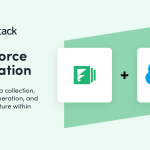When clients lament the quality of Salesforce reports and dashboards, that’s usually a tip-off that a team may need to establish some best practices for entering data. The old adage “garbage in, garbage out” holds true. Your reporting is only as accurate as the provided data. To encourage use of Salesforce as the hub of consistent, shared reporting, we promote the motto: “If it doesn’t exist in Salesforce, then it doesn’t exist at all.”
Exceptions = Opportunities
Another common cause of inaccurate reporting is due to a client working around Salesforce because of an exception or perceived limitation of the platform. To be sure, exceptions arise. But it defeats the benefits of centralized reporting if those wild cards are addressed outside of the Salesforce environment.
Exceptions get us excited because that usually indicates an opportunity to customize Salesforce for consistent entry so the reverse of that above-mentioned “garbage” adage is now true: “Clean data in, clean data out.” Exceptions pave they way for your org to dialogue about how to do business within the Salesforce environment.
TMI!
Still another cause of inaccurate reporting is due to TMI—Too Much Information. The seemingly endless configuration of sales reports and dashboards is just too much information to maintain. While, yes, it may be nice to have any particular report, if it’s not vital, then it’s a roadblock to investing valuable time on reporting tools that are effective.
Better Partners Can Help You Customize Salesforce
To keep Salesforce usable, that may mean hiding tools that currently don’t add value to spare confusion and avoid wasted time on unnecessary entry. This allows team members to quickly enter key data for answers to the business questions you have.
Contact Better Partners for training, customization, and consulting on Salesforce.







